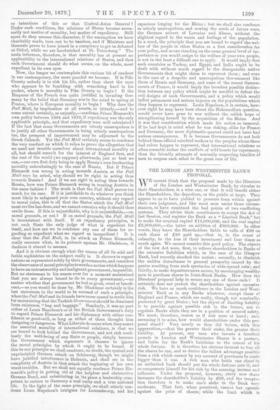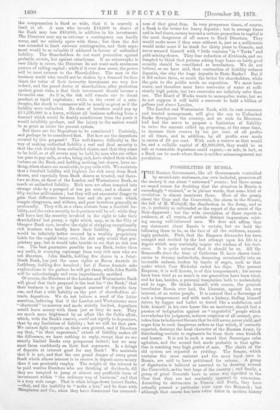THE LONDON AND WESTMINSTER BANK'S PROPOSAL.
WE cannot think that the proposal made by the Directors of the London and Westminster Bank, by circular to their Shareholders, is a wise one, or that it will benefit either the Shareholders, the depositors, or the public at largo. They appear to us to have yielded to pressure from within against their own judgment, and like most men under those circum- stances, to have combined the bad points of two conflicting systems. They advise their constituents to accept the Aet of last Session, and register the Bank as a " Limited Bank," but to make the nominal capital £14,000,000, and the real capital £2,800,000,—the latter an addition of £800,000. In other words, they leave the Shareholders liable to calls of £80 on each share of £20 paid up,—that is, in the event of calamity, to the loss of their investment and four times as much again. We cannot consider this good policy. The objects of the new Act were, first, to relieve shareholders in Banks of the excessive liabilities which, in the case of the Glasgow Bank, had recently shocked the nation ; secondly, to diminish the sudden disturbance to general prosperity caused by the panics resulting from such spectacles of wide-spread ruin ; and thirdly, to make depositors more secure, by encouraging wealthy men to purchase shares in Joint-Stock Banks. How does the Directors' proposal help to secure any one of these ends ? It certainly does not protect the shareholders against excessive risk. We have as much confidence in the London and West- minster Bank as in any Banks whatever, except those of England and France, which are really, though not nominally, protected by great States ; but the object of limiting liability is to provide against possible risk in the future, not to regulate Banks while they are in a position of assured safety. We must, therefore, reason as if risk were at hand ; and, assuming it to arise, how would shareholders under this pro- posal stand ? Very nearly as they did before, with this aggravation,—that the greater their stake, the greater their liability. At present, any man who invests a hundred pounds in London and Westminster Shares is a partner, and liable for the Bank's liabilities to the extent of his whole fortune. It is therefore his obvious interest to buy all the shares he can, and so derive the fullest advantage possible from a risk which cannot by any amount of purchases be made bigger 'than it was. A rich man who holds one share in an unlimited bank should put his whole fortune into it, and so compensate himself for his risk by the accruing income and influence. Under the proposal, however, every new share increases the shareholder's liability by £80, and the tempta- tion therefore is to make one's stake in the Bank very moderate. That fact, when perceived, cannot but operate against the price of shares; while the limit which is
the compensation is fixed so wide, that it is scarcely a limit at all. A man who invests £10,000 in shares of the Bank may lose £40,000, in addition to his investment. The Directors may say so extreme a contingency can hardly occur, and we entirely agree with them ; but then the Act was intended to limit extreme contingencies, and their argu- ment would be as valuable if adduced in favour of unlimited liability. The Shareholders do not want protection against probable events, but against cataclysms. If no catastrophe is ever likely to occur, the Directors do not want such enormous powers of calling capital ; while if it ever does occur, the power will be most ruinous to the Shareholders. The men in the business world who would not be shaken by a demand for four times the value of their favourite investment are very few indeed, and the grand desire of shareholders, after protection against great risks, is that their investment should become a favourite one. As it is, the risk will remain one to daunt prudent or timid capitalists ; while in the event of a cata- strophe, the shock to commerce will be nearly as great as if the liability were unlimited. No class of investors could pay up £11,200,000 in a hurry, without all business suffering from a demand which would be doubly mischievous from the panic it would infallibly produce, and the injury to the nation would be as great as under the present system. But there are the Depositors to be considered I Certainly, and perhaps to be considered first. But how are the depositors secured by this proposal ? The well-known difficulty in the way of making unlimited liability a real and final security is that the rich shrink from unlimited shares, and that they come to be held, or at all events may be held, by men who are either too poor to pay calls, or who, being rich,have staked their whole fortune on the Bank, and holding nothing but shares, have no- thing, when shares are unsaleable, to pay calls with. We maintain that a fourfold liability will frighten the rich away from Bank shares, and especially from Bank shares so trusted, and there- fore so dear, as those of the London and Westminster Bank, as much as unlimited liability. Rich men are often tempted into strange risks by a prospect of ten per cent., and a chance of fifty excites millionaires ; but they will not encounter danger to gain that difference between four and six per cent, which tempts clergymen, and widows, and poor investors generally so profoundly. They will, as a class, abstain from a fourfold lia- bility, and the extra security to depositors will be nil; while they will have lost the security involved in the right to take their shareholders' last penny, a right which may, as in the City of Glasgow Bank case, involve the right of stripping exceptionally rich trustees who hardly knew their liability. Depositors would be infinitely better secured by a wealthy proprietary liable for the capital twice over, for not only would that pro- prietary pay, but it would take trouble to see that no risk was run. The best guarantee possible for any Bank, better than any audit, is worrying espionage from very rich men who are not directors. John Smith, holding five shares in a Joint- Stock Bank, has just the same rights as Baron Anatole de Lothbury, holding five hundred ; but if Baron Anatole asks explanations in the parlour be will get them, while John Smith will be unhesitatingly and even impertinently snubbed.
Of course, the Directors of the London and Westminster Bank will plead that their proposal is the best for " the Bank," that their business is to get the largest amount of deposits they can, and that a wide liability on the part of shareholders at- tracts depositors. We do not believe a word of the latter assertion, believing that if the London and Westminster were "chartered" to-morrow and made strictly limited, depositors would leave money with them just as they do now. They are much more frightened by an affair like the Collie affair, which, with the Bank's reserve, could not signify to depositors, than by any limitation of liability ; but we will let that pass. We cannot fight experts on their own ground, and if Directors say that, "in their experience," extent of liability makes all the difference, we have nothing to reply, except that we see strictly limited Banks very prosperous indeed; but we may meet them confidently on their first argument. Is a deluge of deposits at interest good for any Bank ? We maintain that it is not, and that the one grand danger of every great Bank which allows interest is to receive in deposit more money than it can prudently employ. The weight of the interest to be paid worries Directors who are thinking of dividends, till they are tempted to jump at almost any profitable form of investment within " the ordinary way of business," and that is a very wide range. That is what brings down honest Banks, —that, and the inability to " make a loss," and be done with Shinplaster and Co., when they have discovered the unsound- nese of that great firm. In very prosperous times, of course, a Bank is the better for heavy deposits ; but in average times and in bad times, money beyond a certain proportion to capital is the most dangerous of all snares to Bank Directors. They would make more if they were without it, just as a millionaire would make more if he stuck for thirty years to Consols, and never amused himself with " little ventures " in " Turks " and gold-mining shares. They fear reduction of dividends, and are tempted to think that persons asking huge loans on fairly good security should be conciliated as benefactors. We do not believe, as we have said, that contraction of liability reduces deposits, else why the huge deposits in State Banks ? But if it did reduce them, so much the better for shareholders, while the gain to the public needs no exposition. We must have water, and therefore must have reservoirs of water at suffi- ciently high points, but two reservoirs are infinitely safer than one. The Board of Works wants to monopolise water, but we do not suppose it will build a reservoir to hold a billion of gallons just above London.
The London and Westminster Bank, with its vast resources and trusted management, will give the cue to Unlimited Banks throughout the country, and we wish its Directors had had the nerve to propose a limitation of liability to twice the amount called up, proposing, at the same time, to increase their reserve by ten per cont. of all profits at all times, and in addition, by all profits ever made in excess of 20 per cent. With such a reserve as that would be, and a callable capital of £2,800,000, they would be as safe as reasonable depositors could expect,—as safe, in fact, as a Bank can be made where there is neither mismanagement nor peculation.







































 Previous page
Previous page